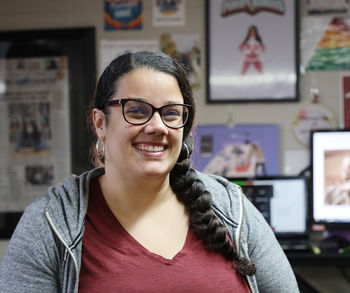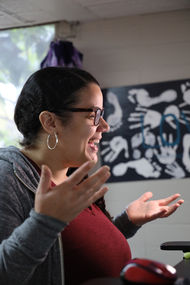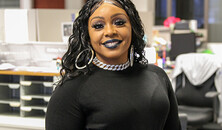'Now is definitely the time to take action'

For Brooke Brown, the question about who her students want to become is as important as their plan for what they want to become.
As an English and ethnic studies teacher and the 2021 Washington Teacher of the Year, Brown makes that an easy fit within her curriculum. And it's especially vital given our nation's racial tensions and renewed efforts to address racial and social justice.
"Ethnic Studies to me is, it's humanizing," Brown says. "It's about love. It's about really learning how to accept and respect who we are as people, as individuals. And that way to build empathy and compassion for one another, and to really learn how to show up for each other ... not as a way to judge where we've been, but as a way to understand where we are today, so that we can heal. So that we can support one another to transform and reimagine what a more just and equitable future could look like for all of us."
Continuing to make personal connections has been one of the biggest teaching challenges for her during the pandemic. Brown has taught at Washington High School in Tacoma since 2006, in the Franklin Pierce School District.
The content of her classes changes each year because teaching must be culturally and community responsive, she says, but also relevant to the unique experiences of each year’s students and our unique time in history. She strives to create a brave, inclusive space where students can be their authentic selves. She typically begins a semester with poetry assignments so students can express their identity and their beliefs, like "For my People" or "Where I'm From," so students can talk about their roots and their dreams.
In her application for teacher of the year, Brown’s building principal, Brent Whitemarsh, recognizes Brown as a skilled instructor, but notes that her greatest contribution "has been working with our students and staff to address the challenges that result from systemic racism and providing strategies to help create equitable learning opportunities for all."
"Brooke is at the forefront of the equity movement throughout the area," Whitemarsh observes.
Brown believes we have reached a tipping point.
"We can't keep doing the things the way we’ve been doing them," she says. "How will we return to buildings in the fall? Will we return back to business as usual, or will we return to something different, something better, something new?"
Schools must change, and her message as teacher of the year is, "Now is the time."
"Covid-19 and the pandemic have blown wide open the structural inequalities that exist in our communities, and we have a chance to think of something new, something better. This is a chance for our profession to work together to give our students the best," Brown says. "We must confront the elephant in the room. The educational opportunities are not equal for all our students. They haven't been, and this won't change unless we start to dream and commit to a new way of doing things. My goal is to help guide that necessary work and channel the care and leadership of educators to focus that work on the best practices of today regarding equity and opportunity."
Brown emphasizes the needs to center our decisions on students and their success, even when that disrupts our comfort as educators. She recalls how most every time we leave a store or restaurant, we’re offered a survey to share our experience. But how often do we do that with our students' families?

"We have the chance to take a hard look in the mirror and ask ourselves some challenging questions," Brown says. "'Is this working? I mean really working? For everyone?' And if the answer is no, then we owe it to our grandchildren to do our best to imagine and make a more just world. To ask our students and families how we can improve. To not be satisfied with the status quo of 'most kids are doing OK.' To be willing to share seats at the table and listen, really listen, to what our students and families need. To what our teachers of color need. To learn who we are and where we come from, both individually and as a nation, so we can move towards becoming more just."
Brown says that as a biracial Black woman, she began teaching in part so that her students would have a teacher who understands and has experienced what it’s like to be biracial: "I wanted to be the person that I needed when I was in school."
As teacher of the year, Brown worked in class with her students in the fall, remotely because of the pandemic, but was released at the end of December to work this year with OSPI. Her work this year focuses on restorative practices.
As schools work to hire and retain more BIPOC (Black, Indigenous and people of color) teachers, thinking about 'why do people become teachers?' is important, she notes. The answer must start long before college teacher-prep programs and includes working today to improve the success of our students, especially those furthest from educational justice.
"We have to start to think about transforming the educational system as a whole," Brown says, "and what does it look like
to support our BIPOC students?"


